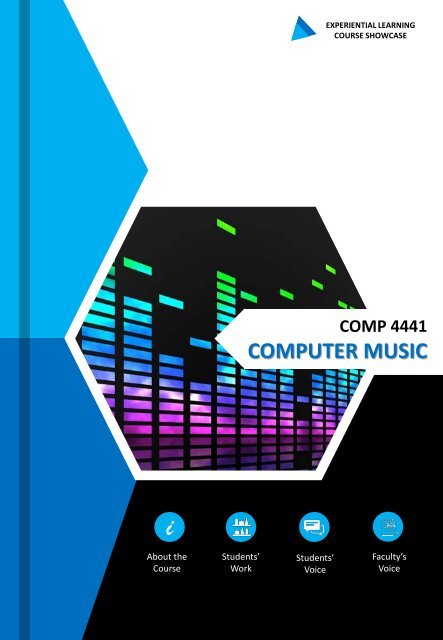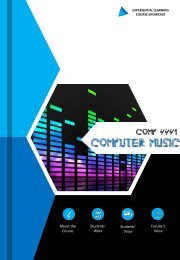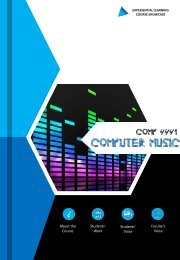Andrew Horner Newsletter
You also want an ePaper? Increase the reach of your titles
YUMPU automatically turns print PDFs into web optimized ePapers that Google loves.
EXPERIENTIAL LEARNING<br />
COURSE SHOWCASE<br />
COMP 4441<br />
COMPUTER MUSIC<br />
i<br />
About the<br />
Course<br />
Students’<br />
Work<br />
Students’<br />
Voice<br />
Faculty’s<br />
Voice
ABOUT<br />
THE<br />
COURSE<br />
_____________<br />
COMPUTER<br />
COMP<br />
This experiential project course will<br />
provide students with hands-on<br />
experiences in creating music and<br />
soundtracks with a wide range of<br />
emotional characteristics for a variety of<br />
situations in computer games and videos.<br />
COURSE SETTING: A Creative Outlet<br />
The course is structured as if students<br />
were at an LA film school for sound<br />
designers, and contrasting in style and<br />
content from other HKUST courses, where<br />
the primary focus includes emotional not<br />
just technical control.<br />
This course will provide students with a creative outlet<br />
where they can apply their problem-solving skills in a deep<br />
and engaging way to music. Whether students have music<br />
background or not, this course will provide a chance to<br />
explore music almost like a composer.
MUSIC<br />
4441<br />
COURSE (RE-)DESIGN<br />
EXPERIENTIAL<br />
LEARNING<br />
The laboratory sessions were restructured with<br />
fantasy-adventure lab assignments. Its<br />
inspiration was to set up the course like a Harry<br />
Potter potions class at Hogwarts.<br />
A total of 9 weekly theme-based lab<br />
assignments were designed. Students had a<br />
chance to develop designs for acoustic music<br />
instruments in computer music languages (e.g.<br />
Csound) and radically adapt music to different<br />
situations.<br />
The lecture sessions changed<br />
accordingly to a briefing and<br />
debriefing format that revolved<br />
around the lab assignments.<br />
Students will share their musical creations and learn<br />
from one another, allowing them to dive in and<br />
create music that modulates the moods of listeners.
SHOWCASE<br />
STUDENTS’ WORKS<br />
_____________<br />
Nine<br />
Theme-based<br />
Assignments<br />
#1 Sound Mirror<br />
Mix it with a DELAYED copy<br />
and BLOW the Mirror<br />
Spirits away<br />
#2 Fantastic Beasts<br />
Tell the beastie<br />
LOVE story with sound!<br />
CLICK & ENJOY<br />
students’ works<br />
#4 Minion Superhero<br />
Tell your Minion Superhero<br />
ADVENTURE story<br />
#5 Beauty & the<br />
Beast Heartbeat<br />
Make the pulse of music<br />
into a ROMANTIC heartbeat<br />
#7 White Snake<br />
Heartbreak<br />
Blend with some SUPER-<br />
AGITATED music into a<br />
heartbreak LOVE song<br />
#8 Minion Blastoff<br />
Blast off using the ascending<br />
SHEPARD TONE effect<br />
on MINION BLASTOFF music<br />
Three<br />
Final Project<br />
Options<br />
#1 Inception X<br />
Trailer/Sequel<br />
Make a TRAILER/SEQUEL for<br />
your own musical countdown. Go<br />
DEEP!<br />
#2 Mood Warping<br />
Transform super-familiar<br />
60-sec music into different<br />
CONTRASTING MOODS
#3 Nightmare Ringtones<br />
Come up with an amazingly-<br />
SCARY nightmare ringtone<br />
#6 Alien Breakdance<br />
Transform some CLASSICAL piece<br />
into BREAKDANCE music<br />
MISSION<br />
IMPOSSIBLE<br />
LAB ASSIGNMENTS<br />
#9 Ghost Train!<br />
Use SHEPARD TONE to<br />
depict your GHOST TRAIN’s<br />
eternal journey<br />
SPRING<br />
2018<br />
#3 Music App or<br />
Game or …<br />
Make a way-out<br />
MUSIC APP or GAME
STUDENTS<br />
VOICE<br />
_____________<br />
The most valuable learning experience is…<br />
“Hands-on experiences from the lab;<br />
sharing the lab results of everyone in<br />
class, very motivating!”<br />
“Learning to use Csound, listening<br />
other students lab songs, because<br />
they are funny and usually give<br />
surprising effects”<br />
“The weekly labs, because it gives<br />
me a chance to experiment with the<br />
concepts learnt in class. And<br />
demoing all the labs in class helps<br />
to give feedback and ideas on what<br />
is good and bad.”<br />
“The experimental part of the course is<br />
very interesting. Sometimes I almost<br />
feel like I'm a composer!”
HOW STUDENTS LEARN IN COMP4441<br />
Understand and analyze the themebased<br />
lab assignment guideline.<br />
Look for relevant audio and video clips<br />
Use applications to apply effects and<br />
modify sounds<br />
Attend debriefing sessions<br />
Share how their musical pieces were<br />
created<br />
Collect instructor’s and peer’s feedback<br />
and think deeply of their own work<br />
EXPERIENCE<br />
W hat happened?<br />
(Facts)<br />
REFLECTION<br />
What did I<br />
experience?<br />
(Feelings)<br />
APPLICATION<br />
What do I do<br />
next?<br />
(Future)<br />
CONCEPTUALIZATION<br />
Why did that<br />
happen?<br />
(Findings)<br />
Evaluate how to modify the sound<br />
using different features<br />
Apply in the next lab assignment<br />
Learn some main concepts taught by<br />
the instructor in the briefing sessions<br />
Appreciate peer’s works and<br />
evaluate different sound effects in<br />
class
HOW STUDENTS LEARN IN COMP4441<br />
Understand the theme-based lab assignment<br />
guideline and look for relevant audio and video clips<br />
Use applications to apply effects<br />
and modify sounds<br />
STUDENTS<br />
VOICES<br />
_____________<br />
“Hands-on experiences<br />
from the lab; sharing the<br />
lab results of everyone in<br />
class, very motivating!”<br />
“The experimental part of the<br />
course is very interesting.<br />
Sometimes I almost feel like<br />
I'm a composer!”<br />
Evaluate how to modify the sound<br />
using different features<br />
Apply in the next lab assignment
WHAT STUDENTS THINK?<br />
Attend debriefing sessions and share their musical pieces<br />
Collect instructor’s and peer’s feedback and think deeply<br />
of their own work<br />
3<br />
2<br />
REFLECTION<br />
What did I<br />
experience?<br />
(Feelings)<br />
CONCEPTUALIZATION<br />
Why did that<br />
happen?<br />
(Findings)<br />
“Learning to use Csound, listening<br />
other students lab songs, because<br />
they are funny and usually give<br />
surprising effects”<br />
“The weekly labs, because it gives<br />
me a chance to experiment with the<br />
concepts learnt in class. And<br />
demoing all the labs in class helps<br />
to give feedback and ideas on what<br />
is good and bad.”<br />
Learn some main concepts taught by<br />
the instructor in the briefing sessions<br />
Appreciate peer’s works and evaluate<br />
different sound effects in class
KEY COMPONENTS OF<br />
DESIGNING EXPERIENTIAL LAB<br />
Don’t just teach the boring<br />
concepts or theories.<br />
Let students APPLY in<br />
different situations that<br />
are meaningful or relevant<br />
to them.<br />
REAL-LIFE<br />
DESIGN a wide genre of<br />
fantasy adventure,<br />
including science fiction<br />
and Hong Kong comics<br />
Let students THINK DEEPLY<br />
of what they have learned<br />
THROUGHOUT the process<br />
REFLECTION<br />
DEBRIEF with deep followups<br />
to the lab adventures.<br />
SHARE students’ works in<br />
class which prompted<br />
discussion among students.<br />
No spoon-feeding!<br />
BELIEVE in your students’<br />
CREATIVITY.<br />
FLEXIBILITY<br />
&<br />
FREEDOM<br />
SET the open-ended<br />
experiential lab assignments<br />
FOSTER great freedom in<br />
musical and technical<br />
approaches<br />
From SIMPLE to COMPLEX.<br />
BREAK DOWN ONE big<br />
assessment into several<br />
tasks.<br />
SCAFFOLDING<br />
ASSESS continuously with<br />
a total of nine lab<br />
assignments and one final<br />
project
COURSE DESIGN & IMPACT<br />
To DEVELOP designs for<br />
acoustic music instruments<br />
in computer music<br />
languages<br />
Course<br />
Learning Outcomes<br />
Lab<br />
Fantasy-adventured<br />
Lab Assignments<br />
Lecture<br />
Briefing and<br />
Debriefing Session<br />
ALIGNMENT<br />
Assessment<br />
COURSE IMPACT<br />
9 Lab Assignments<br />
+ Final Project<br />
Instructional Activities<br />
FACULTY<br />
VOICE<br />
_____________<br />
This experiential learning approach was not just fun and motivating for the<br />
students, but very appropriate for the course goal of creative sound design.<br />
I did not feel compelled to present all the notes, but emphasized and<br />
illustrated the main concepts, and let them explore the rest on their own.<br />
It was really fun to play the soundtracks generated by all the groups in the debriefing<br />
lecture session, since they were wildly different.<br />
Lectures were much livelier this way, and generated many delightful<br />
surprises!
KEY COMPONENTS OF<br />
DESIGNING EXPERIENTIAL LAB<br />
REAL-LIFE<br />
Don’t just teach the boring<br />
concepts or theories.<br />
Let students APPLY in<br />
different situations that<br />
are meaningful or relevant<br />
to them.<br />
DESIGN a wide genre of<br />
fantasy adventure,<br />
including science fiction<br />
and Hong Kong comics<br />
REFLECTION<br />
Let students THINK DEEPLY<br />
of what they have learned<br />
THROUGHOUT the process<br />
DEBRIEF with deep followups<br />
to the lab adventures.<br />
SHARE students’ works in<br />
class which prompted<br />
discussion among students.<br />
FLEXIBILITY<br />
&<br />
FREEDOM<br />
No spoon-feeding!<br />
BELIEVE in your students’<br />
CREATIVITY.<br />
SET the open-ended<br />
experiential lab assignments<br />
FOSTER great freedom in<br />
musical and technical<br />
approaches<br />
SCAFFOLDING<br />
From SIMPLE to COMPLEX.<br />
BREAK DOWN ONE big<br />
assessment into several<br />
tasks.<br />
ASSESS continuously with<br />
a total of nine lab<br />
assignments and one final<br />
project
FACULTY<br />
VOICE<br />
_____________<br />
Lecture<br />
Briefing and Debriefing Session<br />
We did not limit the themes to Harry<br />
Potter exclusively, but to the wider genre<br />
of fantasy adventure, including science<br />
fiction and Hong Kong comics.<br />
The lab descriptions carried the fun,<br />
mystery, adventure, and charm out fully.<br />
This allowed a super-strong linkage of<br />
concepts, and prompted in-class<br />
discussion/reflection questions that<br />
were fun and deep follow-ups to the lab<br />
adventures.<br />
Lab Description<br />
This approach was not just fun and motivating for the students,<br />
but very appropriate for the course goal of creative sound design.<br />
It was really fun to play the soundtracks generated by all the<br />
groups in the de-briefing lecture session, since they were wildly<br />
different.<br />
I did not feel compelled to present all the notes, but emphasized<br />
and illustrated the main concepts, and let them explore the rest<br />
on their own.<br />
Lectures were much livelier this way, and generated many<br />
delightful surprises!




